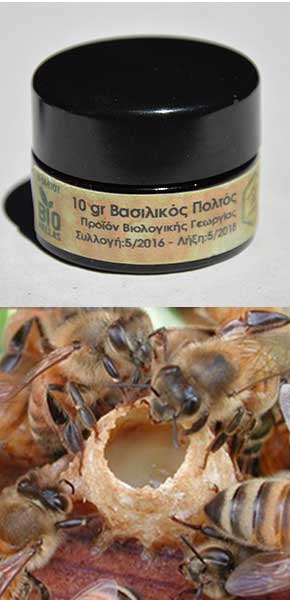"DIAS" Organic Royal Jelly

Royal jelly is a creamy white substance with a high nutrient content that young bees make to feed queen bee larvae.
Royal jelly is secreted from the glands in the heads of worker bees and is fed to all bee larvae, whether they are destined to become drones (males), workers (sterile females), or queens (fertile females). After three days, the drone and worker larvae are no longer fed with royal jelly, but queen larvae continue to be fed this special substance throughout their development. In fact, the queen eats exclusively royal jelly throughout her life.
Royal jelly is a food product. Royal jelly is highly nutritious and may have antibacterial, antioxidant, and anti-inflammatory properties. These properties may be responsible for many of the health claims about royal jelly. People usually consume it orally or apply it directly to the skin.
Royal jelly is comprised of water, carbs, protein and fat The full chemical makeup of royal jelly is unknown, but its positive effects on health are thought to stem from its unique proteins and fatty acids. These include nine glycoproteins collectively known as major royal jelly proteins (MRJPs) and two fatty acids, trans-10-Hydroxy-2-decenoic acid and 10-Hydroxydecanoic acid. Royal jelly also contains several B vitamins and trace minerals.
Royal jelly benefits
Provide Antioxidant and Anti-Inflammatory Effects, Reduce Heart Disease Risk by Impacting Cholesterol Levels, Aid Wound Healing and Skin Repair, Specific Proteins May Lower Blood Pressure, Regulates Blood Sugar by Reducing Oxidative Stress and Inflammation, Antioxidant Properties May Support Healthy Brain Function, Increase Tear Secretion And Treat Chronic Dry Eyes, Provide Anti-Aging Effects Through Various Means, Support a Healthy Immune System, Reduces Side Effects of Cancer Treatment, Treat Certain Symptoms of Menopause
Because research is relatively limited, a definitive recommended dosage for royal jelly hasn’t been established.
When taken as a dietary supplement, royal jelly is available in its natural state — a gel-like substance.
Benefits have been observed in a wide range of dosages. Current research supports possible benefits at 300–6,000 mg per day.


